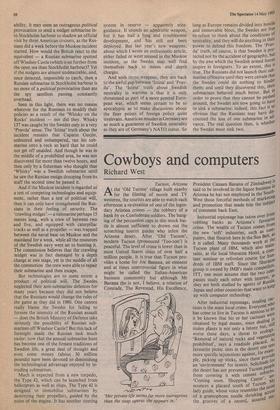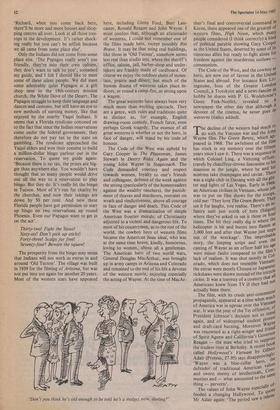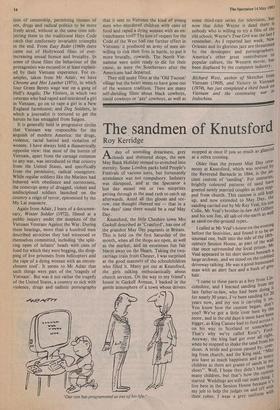Cowboys and computers
Richard West
Tucson, Arizona Athe 'Old Tucson' village built nearby for the filming of movie and TV westerns, the tourists are able to watch each afternoon a re-creation of one of the legen- dary Arizona crimes — the robbery of a bank by ex-Confederate soldiers. The bang- ing of the percussion caps in this mock bat- tle is almost sufficient to drown out the screeching tourist guides who infest the Arizona desert. After 'Old Tucson', modern Tucson (pronouced `Too-son') is peaceful. The level of crime is lower than in most United States cities of over half a million people. It is true that Tucson pro- vides a home for Joe Banana, an eminent and at times controversial figure in what might be called the Italian-American business community but although Mr Banana (he is not, I believe, a relation of Comrade, The Reverend, His Excellency, 'Her private life seems far more outrageous than the soap operas she appears in.' President Canaan Banana of Zimbabwe) iS said to be involved in the liquor business in Arizona he has not employed in the South- West those forceful methods of marketing and promotion that made him the subject of comment back East.
Industrial espionage has taken over from banks as Arizona's favourite crime. The wealth of Tucson comes from the new 'soft' industries, such as conl- puters, that flourish here in the Sun Belt, as it is called. Many thousands work at t.he Tucson plant of IBM, which also main- tains, at the local Sheraton Hotel, a cons' tant seminar or refresher course for hun- dreds of IBM staff. Since the Sheraton group is owned by IMB's main competitor, IT!', one must assume that the two com: panies study each other with interest, .35 they are both studied by agents of Russia,: Japan and other countries that want to keel' up with computer technology.
After industrial espionage, stealing cac- tuses is the main local crime. Everyone vihn, has come to live in Tucson is anxious to le! it be known that his or her cactuses we.re obtained by legal means, sincedealing,1411 stolen plants is not only a felony but, s'i worse these days, a threat to ecologYii 'Removal of natural rocks and vegetatiAo prohibited', says a roadside Placard' s favourite picnic sites in the desert one see. more specific injunctions against, for exanl pie, picking up sticks, since these provincr an 'environment' for insects. Solicitude fci the desert has not prevented Tucson people s from covering it with cement sub" 0: 'Coming soon. Shopping Center',MY nounces a placard south of Tucson lady guide, whose voice resembles the rIM'ss of a gramophone needle shrieking a:
t the grooves of a record, assured lu" 'Richard, when you come back here, there'll be more and more houses and shop- ping centres all over. Look at all those tree- tops in the development. It's rather shock- ing really but you can't be selfish because we all came from some place else'.
Only the Indians did not come from some place else. 'The Papagos really aren't too friendly, they're into their own culture, they don't want to talk to you', screamed my guide, and I felt I should like to meet some of these silent people. We did meet some admirably quiet Papagos at a gift shop next to the 18th-century mission church, the White Dove of the Desert. The Papagos struggle to keep their language and dances and customs, but still have an eye to new methods of earning money, like that enjoyed by the nearby Yaqui Indians. It seems that a Florida syndicate cottoned on to the fact that since the Indian reservations come under the federal government, they therefore do not pay tax to the state on gambling. The syndicate approached the Yaqui elders and won their consent to build a million-dollar bingo parlour out in the reservation. To quote my guide again: 'Because there is no tax, the prizes are big- ger than anywhere else. You wouldn't have thought that so many people would drive out all the way to a reservation to play bingo. But they do. It's really hit the bingo in Tucson. Most of it's run for charity by the churches, and now their takings are down by 50 per cent. And now these Florida people have got permission to start up bingo on two reservations up round Phoenix. Even our Papagos want to get in on the act'.
Thirty-two! Fight the Sioux! Sixty-six! Don't pick up sticks! Forty-three! Scalps for free! Seventy-four! Beware the squaw!
The prosperity from the bingo may mean that Indians will not work as extras in and around 'Old Tucson'. The village was built in 1939 for the filming of Arizona, but was not put into use again for another 20 years. Most of the western stars have appeared here, including Glenn Ford, Burt Lan- caster, Ronald Reagan and John Wayne. I must confess that, although an aficionado of westerns, I could not remember one of the films made here, except possibly Rio Bravo. It may be that using real buildings, like those in 'Old Tucson', somehow seems less real than studio sets, where the sheriff's office, saloon, jail, barber-shop and under- takers are frankly made of cardboard. Of course we enjoy the outdoor shots of moun- tain, prairie and desert; but much of the human drama of westerns takes place in- doors, or round a camp-fire, or sitting upon a wagon.
The great westerns have always been very much more than exciting spectacle. They are a genre, with rules and traditions quite as distinct as, for example, English drawing-room comedy, French farce, even perhaps Greek tragedy. The essence of all great westerns is whether or not the hero, in face of danger, will stand by his code of honour.
The Code of the West was upheld by Gary Cooper in The Plainsman, James Stewart in Destry Rides Again and the young John Wayne in Stagecoach. The Code demanded courtesy and respect towards women, loyalty to one's friends and colleagues, defence of the weak against the strong (particularly of the homesteaders against the wealthy ranchers), the punish- ment of thieves and murderers, restraint on wrath and vindictiveness, above all courage in face of danger and death. This Code of the West was a dramatisation of simple American frontier morals; of Christianity adjusted to a violent and dangerous life. To most of his countrymen, as to the rest of the world, the cowboy hero of western films became the American beau ideal, who was at the same time brave, kindly, humorous, loving to women, above all a gentleman. The American hero of two world wars, General Douglas MacArthur, was brought up in army camps in Arizona and Colorado and remained to the end of his life a devotee of the western movie, enjoying especially the acting of Wayne. At the time of MacAr-
'Don't you think he's old enough to be told he's a midget now, darling?'
The Spectator 14 May 1983 thur's final and controversial command in Korea, there appeared one of the greatest of western films, High Noon, which manY people considered (I think correctly) a kind of political parable showing Gary Cooper as the United States, deserted by some of its timorous allies but ready to fight alone for freedom against the murderous outlaws — communism.
The Code of the West, and the cowboY as, hero, are now out of favour in the Unite° States and abroad. For instance Ken Liv- ingstone, boss of the Greater London Council, a Trotskyist and a newt-fancier (a hobby he shares with P. G. Wodehouse's Gussy Fink-Nottle), revealed to 3 newspaper the other day that although a devotee of the cinema, he never goes to westerns (italics added).
rr he decline of the western had much to
do with the Vietnam war and the John Wayne film The Green Berets, which ap- peared in 1968. The awfulness of the fill° has stuck in my memory over the fifteen years since I saw it. There was a sequence in which Colonel Ling, a Vietcong officer, travels by chauffeur-driven limousine to his mansion in the jungle, where he and his mistress take champagne and caviar. There was a night-club in Danang with all the gilt" ter and lights of Las Vegas. Early in 1969z an American civilian in Vietnam, whose was to put on film shows for the trooPs, told me: 'They love The Green Berets. TheY see it for laughs, you realise. There's an in- fantry unit just north of here (Sai5011) where they've asked to see it three or four times. The bit they really dig is where the helicopter is hit and bursts into flames at 3,000 feet and after that Wayne just steps out of the wreckage'. The improbable story, the limping script and even the casting of Wayne as an officer half his age were minor faults compared to the filM'is lack of realism. It was shot mostly in CcIr orado, which does not resemble Vietnant; the extras were mostly Chinese or Japanese; rickshaws were shown instead of the tricycle &km. It was a travesty of a country that ! Americans knew from TV if they had n°1 actually been there. ist The film, with its crude anti-comnin° propaganda, appeared at a time when riniell of America was in uproar over the vietnal war. It was the year of the let offensive, President Johnson's decision not to start: again, and of widespread student protest and draft-card burning. Moreover WaYni was renowned as a right-winger and friec °_, of Spiro Agnew and California's G°verricis: Reagan — the man who tried to siiPPre ilbe cthaellesdtudentriotsat Hollywood'sBerkeley. vmietnaA recent b°131‘.
by
Adair (Proteus, £7.95) says disaPProvillg-Y; t 'Wayne was a blue-collar hero, nes defender of traditional American vat. and sworn enemy of intellectuals, C°Il'e munists and — what amounted to the sam thing — perverts'.
The values of John Wayne 'allY
especi _.e fended a changing Hollywood. To (1°°`. Mr Adair again: 'The period saw a relax° tion of censorship, permitting themes of sex, drugs and radical politics to be more freely aired, without at the same time sub- jecting them to the traditional Hays Code catch that conformity invariably triumphs in the end. From Easy Rider (1969) there came out of Hollywood films of ever- increasing sexual licence and brutality. In some of those films the behaviour of the protagonists was excused or at least explain- ed by their Vietnam experience. For ex- amples, taken from Mr Adair, we have Chrome and Hot Leather (1971), in which four Green Berets wage war on a gang of Hell's Angels; The Visitors, in which two veterans who had raped and murdered a girl in Vietnam, go on to rape a girl in a New England farmhouse; and Dog Soldiers, in which a journalist is tortured to get the heroin he has smuggled from Saigon.
It is generally held in progressive circles that Vietnam was responsible for the anguish of modern America: the drugs, violence, racial hatred and violation of women. I have always held a diametrically opposite view: that most of the horror of Vietnam, apart from the carnage common to any war, was introduced to that country from the United States, and specifically from the permissive, radical youngsters. While regular soldiers like the Marines had behaved with obedience and correctness, the conscript army of drugged, violent and undisciplined soldiers launched on the country a reign of terror, epitomised by the My Lai massacre.
Again from Adair, I learn of a documen- tary, Winter Soldier (1972), filmed at a public inquiry under the auspices of the Vietnam Veterans Against the War. During these hearings, more than a hundred men described atrocities they had witnessed or themselves committed, including 'the split- ting open of infants' heads with cans of food for which they were begging, the drop- ping of live prisoners from helicopters and the rape of a dying woman with an entren- chment tool'. It seems to Mr Adair that such things were part of the 'tragedy of Vietnam'. But was it not rather the tragedy of the United States, a country so sick with violence, drugs and sadistic pornography that it sent to Vietnam the kind of young men who murdered children with cans of food and raped a dying woman with an en- trenchment tool? The loss of respect for the Code of the West had one further effect in Vietnam: it produced an army of men un- willing to risk their lives in battle, to put it more brutally, cowards. The North Viet- namese were quite ready to die for their cause, as were the Southerners after the Americans had departed.
They still make films at the 'Old Tucson' village but the heart seems to have gone out of the western tradition. There are many self-deriding films about black cowboys, timid cowboys or 'gay' cowboys, as well as some third-rate series for television, but now that John Wayne is dead there is nobody who is willing to try a film of the old school; Wayne's True Grit was the last I remember. As I reported last week, New Orleans and its glorious jazz are threatened by the developers and pornograPhers. America's other great contribution to popular culture, the Western movie, has been displaced by the computer industry.
Richard West, author of Sketches front Vietnam (1968), and Victory in Vietnam (1974), has just completed a third book on Vietnam and the continuing war in Indochina.












































 Previous page
Previous page